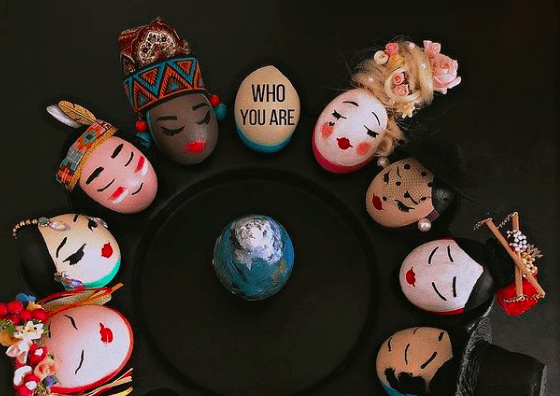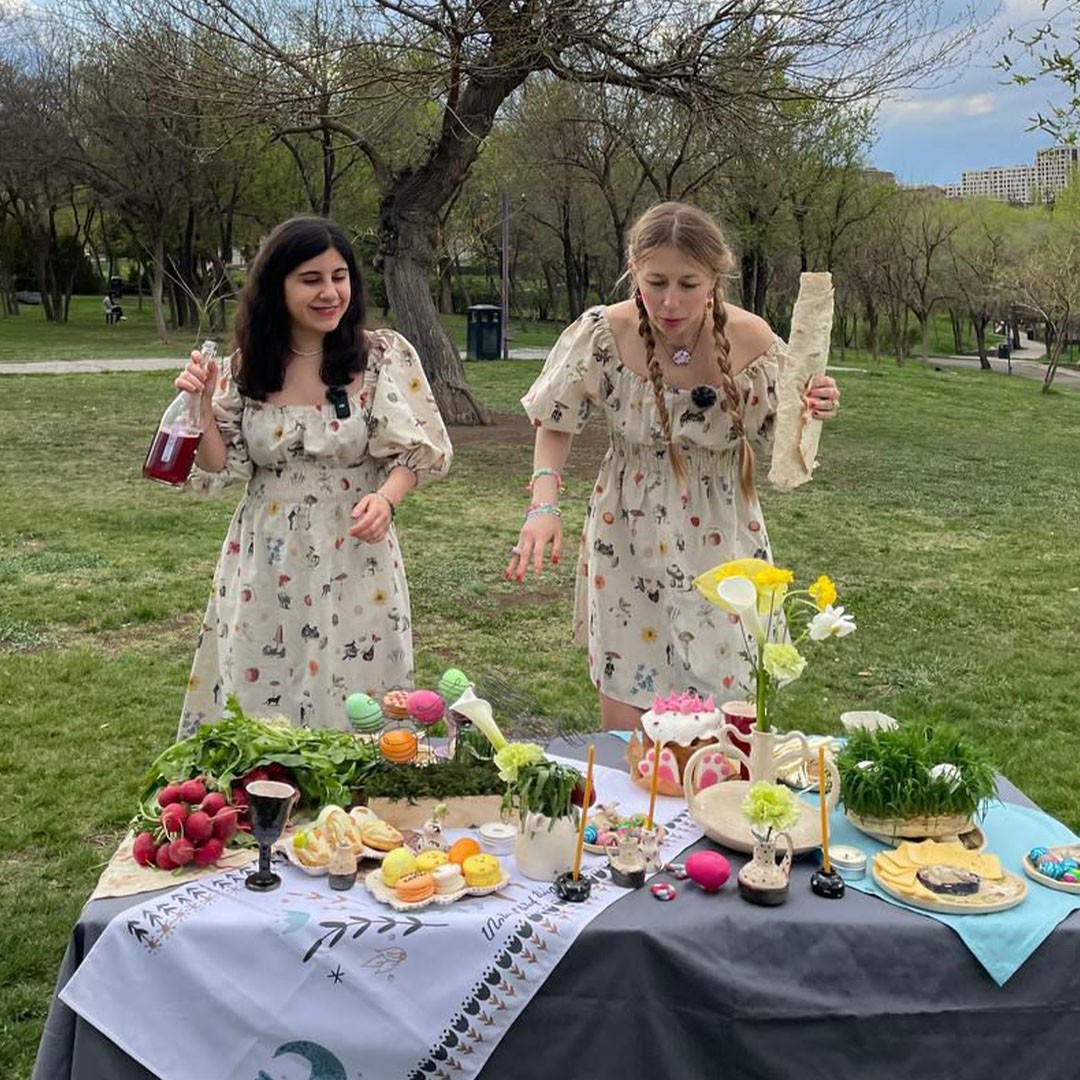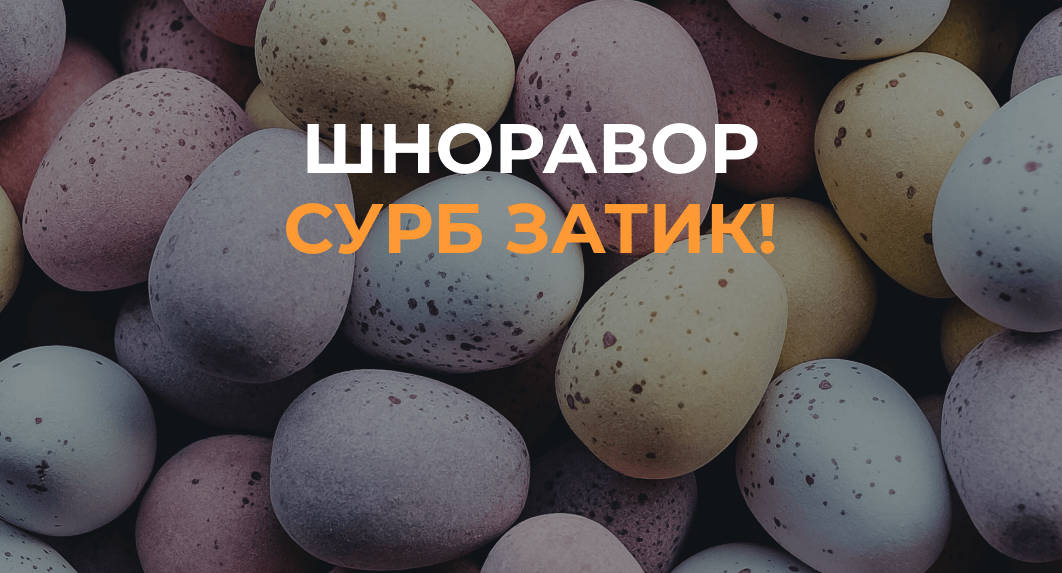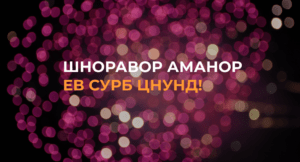In winter we are talked about how Armenia celebrates Christmas and New Year, now the time has come for the main holiday of all Christian believers, — Easter. In this article we will tell you why Armenian Easter is called “Zatik”, what traditions accompany the holiday and what kind of food is necessarily present on the Easter table.
Erika Kazarian: “On Great Saturday evening, the Holy Liturgy of Christmas Eve is held in Armenia, and after it, Zatik, in fact, Easter itself is celebrated. The main celebration of Easter begins on Sunday with a solemn morning service. Armenians bring eggs from home to church to consecrate, and then at home in the family circle they celebrate and arrange a comic “battle of the eggs”. On this day, everyone greets the Resurrection of Jesus Christ, saying: "Christ is risen from the dead", to which you are supposed to answer: "Blessed is the resurrection of Christ." In Armenian, the Easter greeting sounds like this: "Christ Aryav and Merelots." And in response: “Ornyale Harutyun Khristosi”.
Armenians, of course, have a traditional Easter table. It is always wine, because the vine is a symbol of God's chosen people. And if this is wine from grapes grown at the foot of the biblical Mount Ararat, then the table is doubly beautiful. There is always a lot of fresh herbs of different kinds. Boiled fish, because fish also has a deep Christian meaning. The acronym Ichthys (ancient Greek ΙΧΘΥΣ) is translated as "fish", and stands for "Jesus Christ God's Son the Savior." This is an ancient monogram of the name of Jesus Christ. Favorite delicacy - "sweet pilaf" of rice, raisins and dried fruits. Dessert is usually freshly baked gata. Well, and, the most important attribute of the Easter table is colored eggs. Most often they are painted in a color from burgundy to red, because the red color symbolizes for Christians the blood of the crucified Christ. And although there are a million creative ways to decorate eggs today, many families continue to use the old grandmother's recipe - boil eggs in onion skins.
Easter for me very sacred holiday, which causes a special thrill. And his attributes are more of an auxiliary value.

Photo from the personal archive of Erika Kazarian
Diana Barseghyan: "In Russian-speaking families, they greet each other with the words "Christ is risen" and answer "Truly risen." There is no special custom to give gifts, but if you go to visit you can take wine with you.
We always have eggs on the table, usually multi-colored with drawings. Eggs are eaten like this: crushed boiled eggs, salt and tarragon are wrapped in pita bread. It's called "brtuch". Armenian pomegranate wine is a must. Boiled fish, rice with raisins / prunes, herbs, charaz (various types of nuts). In addition to Easter cake, Armenians also have a tradition of baking gata for Easter. My sister puts a coin in one of the pieces, and it is believed that whoever gets it will be lucky in the coming year.
We definitely go to church. And after Easter comes "Merelots": it is customary to remember the dead. Everyone goes to the cemetery and leaves gata and eggs on the graves of the dead.”

In the photo, Inesa Tadevosyan and Yana Pachkovskaya are serving the Easter table
Inesa Tadevosyan: “We don’t have a tradition of giving each other gifts for Easter, but if you go to visit, you can take wine and sweets with you. The custom of clinking eggs in Armenia is very fond of both adults and children, I heard that in Russia it is customary to go to neighbors to knock eggs. There is no such thing here, but everyone in the family does it.
On our Easter table, there is sure to be everything to roll borum from pita bread, eggs and greens - tarragon, marul, kotem. Spinach is usually cooked with an egg, there should be rice with dried fruits, boiled fish and dry red wine.
I personally do not go to church, my dad did - he was very fond of such traditional things. With his death, the tradition of going to church on Easter left our family. In Armenia, people usually go to the service on Saturday evening, mostly those who observed Great Lent. On Sunday morning, there is also a divine service, which is usually attended by officials of the country, representatives of the government. As a rule, families do not go to institutions; Easter in Armenia is a home holiday. My sister has a big house and she invites our whole big family to celebrate Easter.
When I was little, and now for my nephews, we hide a coin in the Easter cake before baking it. And that is why the moment of cutting the cake is always very exciting - everyone is waiting for the coin to come across to him. It is believed to bring good luck."
Easter in the Armenian Apostolic Church falls on the first Sunday after the spring equinox and full moon and falls on the period from March 20 to April 27. The etymology of the name "Zatik" refers to the Armenian words "azatvel" and "azatutyun" (to be released/freedom). Professor Martiros Ananikyan in his book "Myths of Armenia" explained the connection of the festival of Zatik with the celebration of the god of fertility, which, like Adonis, was probably considered Zatik.
“In the Armenian translation of the Bible, the Jewish Pesach was called the “Zatik festival”, and from time immemorial the Armenian Church has used this name in relation to Easter. Zatik, meaning "Easter", is unknown to the Greeks and Syrians. The spring feast of the god of vegetation could appropriately name both the Jewish Passover and the Christian Passover. The spring celebrations of the death and resurrection of Adonis have often been adopted and identified by Christian churches with the death and resurrection of Christ. However, there are no traces of constant worship of Zatik among Armenians in history, although an integral part of their Easter celebrations is the theatrical mourning, funeral and resurrection of Christ..
Happy Easter to you! If you are interested in the history and traditions of Armenia, we invite you to get acquainted with Move2Armenia Culture — is an initiative that organizes free history and Armenian language lessons, dance classes, cooking classes and trips to museums.

















Add a comment